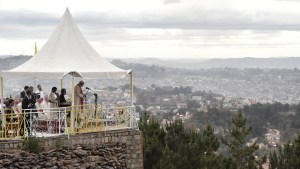Lenten Campaign 2025
This content is free of charge, as are all our articles.
Support us with a donation that is tax-deductible and enable us to continue to reach millions of readers.
“Only man is capable of work, and only man works, at the same time by work occupying his existence on earth, ” writes Pope John Paul II. In his 1981 encyclical letter titled Laborem Exercens(“On the Dignity of Human Labor”), John Paul II argued that in order to understand the dignity of human work, we must consider two dimensions of labor. According to the late Roman Pontiff, work has an objective and a subjective dimension. It is the often overlooked subjective dimension, however, that helps us to assess whether an economic system is just and what—including rest—is due to the worker.
“There are always fresh hopes, but also fresh fears and threats, connected with this basic dimension of human existence: man’s life is built up every day from work, from work it derives its specific dignity, but at the same time work contains the unceasing measure of human toil and suffering,” teaches John Paul II. But what does work really mean in our lives?
The objective dimension
According to John Paul II, the objective dimension of work is that which is produced. Whether crops grown, buildings built, services rendered, or masterpieces painted: humankind is called to cultivate the earth and transform its produce. “Agriculture constitutes through human work a primary field of economic activity and an indispensable factor of production,” writes John Paul II. “Industry in its turn,” continues the late pope, “will always consist in linking the earth’s riches-whether nature’s living resources, or the products of agriculture, or the mineral or chemical resources-with man’s work, whether physical or intellectual.”
The risk, however, is that technology, which facilitates and strengthens humanity’s efforts, will displace our dignity. “Technology can cease to be man’s ally and become almost his enemy, as when the mechanization of work ‘supplants’ him, taking away all personal satisfaction and the incentive to creativity and responsibility, when it deprives many workers of their previous employment, or when, through exalting the machine, it reduces man to the status of its slave,” writes the pope.
The subjective dimension
“Man has to subdue the earth and dominate it, because as the ‘image of God’ he is a person, that is to say, a subjective being capable of acting in a planned and rational way, capable of deciding about himself, and with a tendency to self-realization,” teaches John Paul II. A person is the subject who works.
“Human work has an ethical value of its own,” the pope continues, “which clearly and directly remains linked to the fact that the one who carries it out is a person, a conscious and free subject, that is to say a subject that decides about himself.” Thus, for John Paul II, the source of the dignity of work is to be found chiefly in the subjective rather than objective dimension. The one who labors, rather than labor itself.
Critique of materialism
A pressing issue comes to the fore today concerning materialism. Materialism mistakenly prioritizes the objective, rather than subjective, dimension of labor. Elaborating on the crisis of materialism, John Paul II says, “In all cases of this sort, in every social situation of this type, there is a confusion or even a reversal of the order laid down from the beginning by the words of the Book of Genesis: man is treated as an instrument of production, whereas he-he alone, independently of the work he does-ought to be treated as the effective subject of work and its true maker and creator.”
The right to rest
An economic system that prioritizes the subjective dimension of labor recognizes the rights and dignity of workers. John Paul II holds that social benefits like just wages and medical care for work-related injury are due to workers. These are derived from the subjective dimension of work.
Additionally John Paul II teaches that workers have the right to rest. He elaborates what this means saying, “In the first place this involves a regular weekly rest comprising at least Sunday, and also a longer period of rest, namely the holiday or vacation taken once a year or possibly in several shorter periods during the year.”
Again, the dignity of the subjective dimension of labor stems from the fact that by working, man imitates God. Made in the image of God human persons, in a sense, develop the activity of the Creator by working. But it is not only in work that we imitate the Creator. John Paul II writes, “Man ought to imitate God both in working and also in resting.” This is because God presented his own creative activity under the two forms of work and rest.
God rested on the seventh day. John Paul II writes, “Man’s work too not only requires a rest every ‘seventh day,’ but also cannot consist in the mere exercise of human strength in external action; it must leave room for man to prepare himself, by becoming more and more what in the will of God he ought to be, for the ‘rest’ that the Lord reserves for his servants and friends.” Our work is a participation in God’s activity, and so too is our rest.





